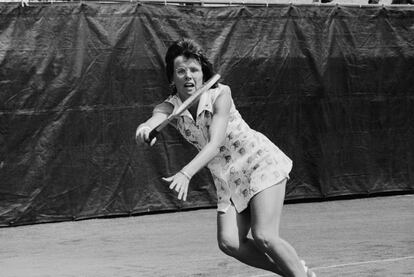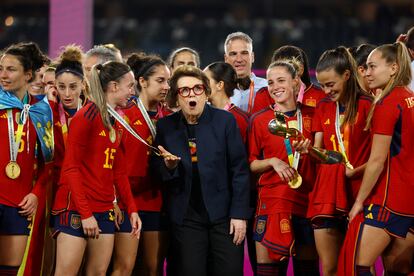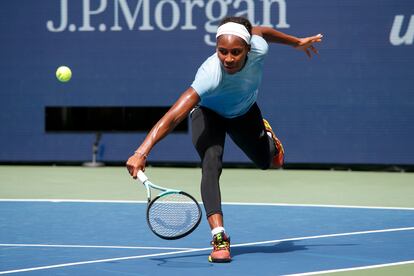Tennis and equality: Progress, but there is still some way to go 50 years after US Open parity
The American hard-court major led the way in equal prize money thanks to the efforts of Billie-Jean King, but in many smaller tournaments the gender gap remains between the ATP and WTA


Billie Jean King is a hyperactive 79-year-old who is a familiar face at major sporting events, seen in the box at the tennis Grand Slams or posing with the Spanish national women’s team after winning the World Cup. She holds regular meetings with politicians including Barack Obama or current U.S. president Joe Biden. King is also one of the greatest tennis players in history. She won 12 major singles titles, 27 in women’s and mixed doubles, and seven Federation Cup titles — the most important women’s international team competition, now called the Billie Jean King Cup — and is a former world number one. Her impact, however, went much further than the courts.
In 1972, when she won her third U.S. Open, instead of resorting to the usual clichés at the final ceremony, she made a stand. “I said to myself, ‘This sucks.’” King was referring to the pay inequality between men and women: the $15,000 difference between her and the male champion, Ilie Nastase. The organization awarded the Romanian $25,000 for winning the men’s title, compared to the $10,000 that the American received. “It’s not just about the money, it’s about the message,” King recalls now, 50 years after she managed to get the United States Tennis Association (USTA) to match the winners’ prizes the following year.
That year, 1973, King also starred in the Battle of the Sexes — the historic media match in which she beat Bobby Riggs, a 55-year-old former world number one — and succeeded in founding the association that watches over the rights of professional female players, the WTA. “No individual has done more to secure equality for female athletes than Billie Jean King. Her impact goes far beyond the tennis court, and there is no better time to celebrate her legacy than on the anniversary of this historic milestone,” said USTA president Brian Hainline.

From King to Venus Williams
“Billie has rightfully received numerous honors and accolades in her life,” added US Open tournament director Stacey Allaster. “But the time has come for our nation to recognize her achievements with the Congressional Gold Medal for the wide-ranging positive impact these achievements have had on generations of women, men, girls, and boys of all backgrounds, making our country a better place.”
Before, during and after her sporting career, King projected herself as an unyielding activist to whom New York is paying tribute on the 50th anniversary of pay equality at the U.S. Open. Beyond the rivalry between Carlos Alcaraz and Novak Djokovic, or what the always unpredictable women’s draw may bring, King is the star of the 2023 tournament at Flushing Meadows. King’s trailblazing equal pay campaign cannot be underestimated: it was not until 2001 that the Australian Open followed suit, while Roland Garros and Wimbledon did so in 2006 and 2007 respectively. In the latter case, the input of her compatriot Venus Williams — a five-time champion at the British grand slam — was pivotal.
“I don’t think any woman should have to worry about whether she is paid equally. I’m very happy that no woman should have to worry about that anymore and that we can just play tennis,” Venus, who is still active on the WTA Tour, said recently. However, the equality established at the four Grand Slam tournaments does not yet extend to the remainder of tour-level competitions, where the gap has narrowed in recent times but remains very noticeable.

The WTA’s plan
For example, France’s Richard Gasquet earned $97,000 for winning in Auckland at the beginning of the year, compared to $34,000 for American Coco Gauff. And shortly afterwards, in Rome, the gap between men and women was again highlighted; the prize money for men amounted to €8.5 million ($9.2 million), compared to €3.5 million ($3.8 million) for the WTA players. In the case of the Madrid Masters, the figure is identical: €1.1 million ($1.2 million) for each winner. The same is true at Indian Wells and Miami. At Flushing Meadows, the winners this year will pocket $3 million each. However, in many other lower categories — the WTA 500, 250 or 125 — the contrast is even more evident compared to the same events on the men’s ATP Tour.
In June, the WTA announced that it has devised a long-term plan aimed at narrowing the gap. Specifically, it envisages the calendar including seven two-week WTA 1000 events that will have the same prize money as the men’s by 2027, and that it will organize three more one-week tournaments that will have equal prize money by 2033; as for the WTA 500, the organization is aiming for prize money parity in combined events by 2027 and for uncombined events by 2033. In the case of WTA 250-level tournaments, the women’s governing body aims to see prize money rise by 34% over the next decade.
“Obviously there are still a lot of inequalities, but apparently they have put forward a 10-year blueprint to improve the situation. We have a long way to go, but I’m proud to say that we are where we are, especially in the Grand Slams,” says 19-year-old Gauff. “I think we deserve more, we are doing very well,” adds Tunisia’s Ons Jabeur, a Wimbledon finalist this year. “We are an example to follow because tennis is the best paid women’s sport, but there is still a lot to do. We saw what happened with women’s soccer [women and men get equal pay in the United States, as of last year], and I think it’s been very inspiring for us to see them fight for that,” says American world number three Jessica Pegula.
Sign up for our weekly newsletter to get more English-language news coverage from EL PAÍS USA Edition
Tu suscripción se está usando en otro dispositivo
¿Quieres añadir otro usuario a tu suscripción?
Si continúas leyendo en este dispositivo, no se podrá leer en el otro.
FlechaTu suscripción se está usando en otro dispositivo y solo puedes acceder a EL PAÍS desde un dispositivo a la vez.
Si quieres compartir tu cuenta, cambia tu suscripción a la modalidad Premium, así podrás añadir otro usuario. Cada uno accederá con su propia cuenta de email, lo que os permitirá personalizar vuestra experiencia en EL PAÍS.
¿Tienes una suscripción de empresa? Accede aquí para contratar más cuentas.
En el caso de no saber quién está usando tu cuenta, te recomendamos cambiar tu contraseña aquí.
Si decides continuar compartiendo tu cuenta, este mensaje se mostrará en tu dispositivo y en el de la otra persona que está usando tu cuenta de forma indefinida, afectando a tu experiencia de lectura. Puedes consultar aquí los términos y condiciones de la suscripción digital.








































